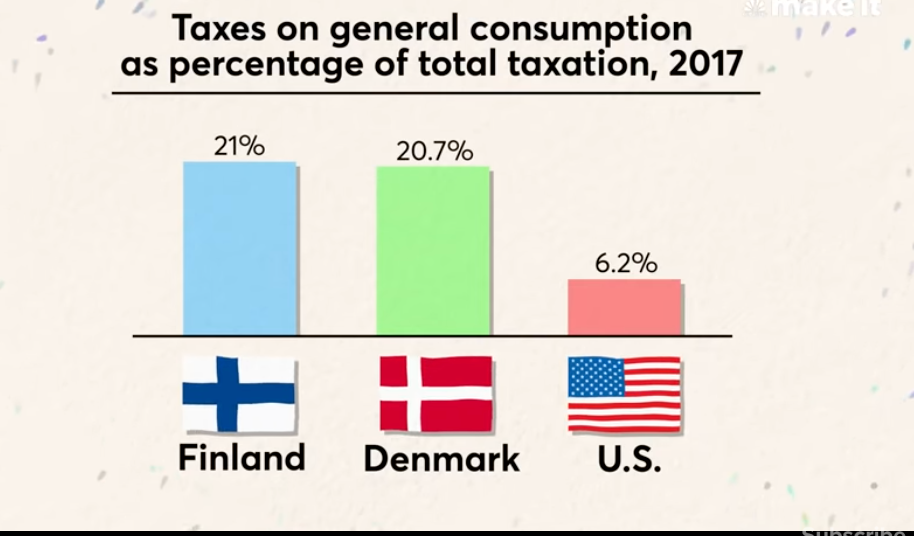In most surveys to competitions, rankings to championships you name it, America prefers to be first and attempts to dominate every stage possible.
From boasting about the number of work hours per week, to expansiveness of innovation, number of Fortune 400 nominees to stock market performance, the wealthiest country in the world tries too hard that it ends up failing in the most important part of life.
Level of Happiness.
Although talent, winnings, accolades, prizes, and sacrifice seem miraculous and are commendable, these achievements and doses of adrenaline soon fade and don’t seem to provide lasting happiness to most.
Each year, a group of happiness experts from around the globe rank 156 countries based on how “happy” citizens are, and they publish their findings in the World Happiness Report. Ever since the report came out, the wealthiest most so-called prosperous, revolutionary countries haven’t been on top.
Happiness might seem like an elusive concept to quantify, but there is a hidden science to it and that science is relatively simple, in fact, too simple Americans won’t buy it. Even the American Dream is rare.
When researchers talk about “happiness,” they’re referring to “satisfaction with the way one’s life is going,” Jeff Sachs, co-creator of the World Happiness Report and a professor at Columbia University, tells CNBC Make It.
Digging for meaning, purpose, and being physically and spiritually in the present are hard to discover when purposely looking for it, typically in regards to winning.
“It’s not primarily a measure of whether one laughed or smiled yesterday, but how one feels about the course of one’s life,” Jeff says.
According to CNBC, “Since the report began in 2012, Nordic countries — which include Denmark, Norway, Sweden, Finland and Iceland, plus the Faroe Islands, Greenland and Aland — consistently turn up at the top of the list. (The United States, on the other hand, typically lands somewhere around 18th or 19th place.)”
Before we move on and learn why the U.S. is a bummer, did you expect it to be around 18th place above war-zone, 3rd world emerging market countries? That is disappointing in itself. Although rankings aren’t important, they don’t lie and America tends to seem like a sore looser within everything.

What You Feel Is What You Choose
Personally as a personal finance advocate, entrepreneur, student, and blogger, I follow this mission because I want to see change in this macho-dominated field. There’s a bad rap that women are overly cautious, concerned, and skeptical about investing and this taboo centered around money must stop once in for all.
This drive for breaking the gender gap and promoting money talk brings me more joy every time I focus on it and has naturally evolved around my life because I want it to. I wouldn’t be cranking out 5+ articles per week on investing or fin-lit if I didn’t like it! By far this is the most engaging activity I do besides reading about it! Sadly, most Americans don’t feel this way about what they spend 90% of their waking hours in which is clearly evident in the Great Resignation and labor shortage unfolding these days.
If you want to quit, this is argued as the opportune time to do so as workers have assessed their lifestyle during lockdown and come to realize they would prefer to not commute 5 hours each day and save a little money, time, sanity, and in turn, spend more quality time finding things that bring them joy, something we as a culture haven’t prioritized.
Why is that?
Although I don’t have a clear answer, it lies in our lack of dedication to ourselves. We compare ourselves to what others are doing instead of what is best for us. I guarantee you you would be sitting on cloud9 instead of regretting every decision you’ve made if you stuck to your lane and focused on what you want out of life. The Nordics up north already figured this out a long time ago. Americans have a lot of catching up to do thanks to this extreme consumeristic anxiety social-media burnout prone society.
Majority of your day is taking care of others instead of yourself. Nothing is wrong with that but how can you possibly be the best caregiver you can be if you don’t take care of yourself? It’s not selfish, it’s necessary.
Although we hear that the 5-day work week is suboptimal for our productivity, performance, lifestyle, and wellbeing in the 21st century, it doesn’t seem like the world is pushing towards any change.
Why?
Because no one likes change. Why change if everything is working well already? Sky-high record profits from the pandemic surge requires more of a strain on workers. Change could restrain business and risk profit decline. Sadly, we only change when it’s too late or if there needs to be change from a performance or financial standpoint not usually from a wellbeing, mental-health standpoint.
The conversation around mental health and our environment has grown over the past few years which has lead to movements across the nation for better working conditions and sane hours. Some companies are making remote work permanent after the pandemic proved renting a building in San Francisco or commuting isn’t worth it. Although I would disagree and say it is in fact more expensive to monitor workers from home and keeping workers from an optional in-person office can be deadly from a mental health perspective, some companies attract specialized workers who prefer the at-home set-up instead. After all, research proves that we can get more done, enjoy our work more, and work more efficiently in less hours or even at home but that also comes at a cost. With more distractions, blurred boundaries, and no team bonding, work doesn’t feel like work at home.
No matter what your position in the WFH debate may be, there’s no right or wrong answer.
As a college student, I know remote zoom school will never replace in-person learning. College is one of the most transformative periods of our lives where we are there to meet people not just study. We’ve learned that we can learn more on our own. College is about networking, gaining hands on experience, meeting professors, and experimenting in whatever way that may be. Zoom can never replicate it and as well in parts of the office. But how can we draw the line? Burnout, mental illness, fatigue, loneliness have all skyrocketed during the pandemic, especially for middle aged women who couldn’t find boundaries between childcare and work and teenage girls trapped on their nuclear weapons, their iPhones.

Up North
For a solution to this American lifestyle crisis, let’s head up north. Remember to bring your overpriced Canada Goose and Uggs. Every American should own these products by now with the whooping $14.5 trillion consumer debt load Americans carry.
Without further ado, let’s dive into the small changes Europeans make for free that make such a tremendous difference in life satisfaction and longevity.
If I asked you, what does it take for you to feel happy, I would most likely get answers that fall under a few distinct categories:
-Money
-Family
-Some sort of work
-People
And guess what. This is universal! All humans have basic needs and wants. We want to feel supported, loved, safe, respected, and need some sort of drive in life which becomes trickiest for most. Without a drive, you are purposeless and before you know it you will try to supplement your happiness with a juicy paycheck or some sort of drug, usually a toxin that will only overwhelm you more.
Believe it or not, people need pain. Pleasure is pain and we seek it to feel good and be productive. If we had everything, we would get nothing done. Our limitations allow us to be us and what we have is what we already have inside of us. Our constraints propel us.
This is the complete opposite of what we preach in America. We believe we are never good enough and the Joneses across the street have everything.
Remember folks. What someone HAS doesn’t reflect WHO they are.
From self-help to self-love, we ride on endless rollercoasters consuming content that goes in one ear out the other attached to our screens mindlessly regurgitating information that isn’t helping any of us.
The Nordic counties call this madness and have an entirely different approach that allows them to retain 10x more knowledge and satisfaction.
My parents migrated from Poland, a country close enough to these Nordic sanctuaries. They’ve witnessed the drastic changes of what culture is like here vs. there straight away. It isn’t the abundance of fast food or gyms, although there are much less of them anywhere outside of the U.S. anyway, but the way they treat each other and take care of themselves in Europe is beyond impressive.
Sure Europe may not be as innovative, debatable, wealthy, debatable, “prosperous”, once again debatable, healthy, very debatable and so on and so forth, but they do feel their basic human needs are met more often than here in the U.S.
And at the end of the day, isn’t that all that matters? You won’t regret not making that extra $100, but instead not spending time with someone or ignoring your body when it needed rest.
Why does a human need to have a fancy title, position and salary to be happy?
We all know it looks good on paper but it soon declines due to hedonic adaption and internal motivation.
The Nordic countries don’t chase this allure or LinkedIn Premium. They seem to have it all figured out, especially Finland and Denmark who’ve consistently topped the United Nations’ most prestigious index, The World Happiness Report, in all six areas of life satisfaction: income, healthy life expectancy, social support freedom, trust and generosity.

Happiness to The Happiest
Happiness to the top countries on the list entails the way one’s life is going and how they feel about it.
Lots of factors play into happiness such as salary and community but our satisfaction of relationships from personal to professional matter most.
They know they have people to rely on in times of need and those they can share their worries and life plans with. This dramatically drops the more one earns. You can read about it here.
Here are additional factors that play into Finland and Denmark’s remarkable happiness levels:
-Strong and rising GDP per capital-usually dependent on population growth
-Healthy life expectancy
-Freedom to make life choices
-Social support-all free in most of Europe, new mothers’s get a free baby box, they don’t need to buy supplies for 3–5 months besides diapers, supplied with 10 months of parental leave, free education, free health care and government support
-Generosity and trust amongst communities-can leave baby outside coffee shops while running errands in Finland
-Less poverty, injustice and crime due to equal wealth balance
-Don’t need to struggle to find a job with gov’t stimulus
-No disperse wealth inequality inbalance-leads to wonderful satisfactory life
-Minimalist frugal culture, invest in experiences not things
-Work life balance, 4 days a week, 1–2 hr lunches outside
-Personal freedom- shape the life you want, social security-receive $2k a month while unemployed
Despite higher consumption taxes on everyday goods, the Danes and Finns don’t mind since they get free services that make Americans broke such as health insurance, college, day-care, and time-off.

Once we hit a certain income of approximately $75k, an additional x amount of money won’t change the way we feel about ourselves and instead usually lead us into a deeper hole of resentment, self-consciousness, and depression.
The law of diminishing marginal returns works in everything in life. From ice cream to the zeros in the bank. More doesn’t mean better. We tend to enjoy less of an additional product and instead less means more in the more fruitful worthwhile things that last.
And for those who were wondering about this as I was, no weather does not in fact play a role in happiness. You can be happy in a dreary wintery wonderland.
Sure it affects mood here and there but nothing stands a chance against these countries’ level of happiness, proving these tricks, programs, and benefits are resilient to anything.
Happy finding your happy. Chase it before it’s too late.

